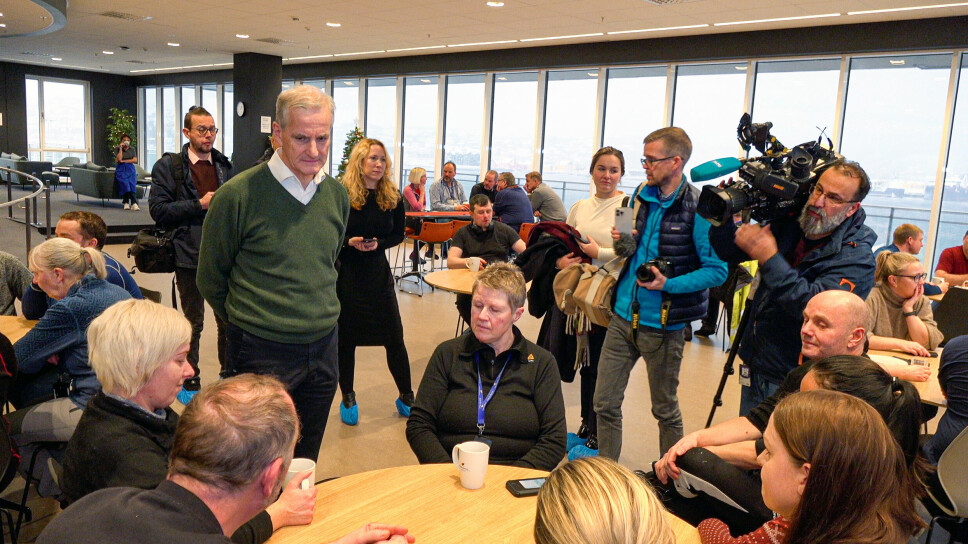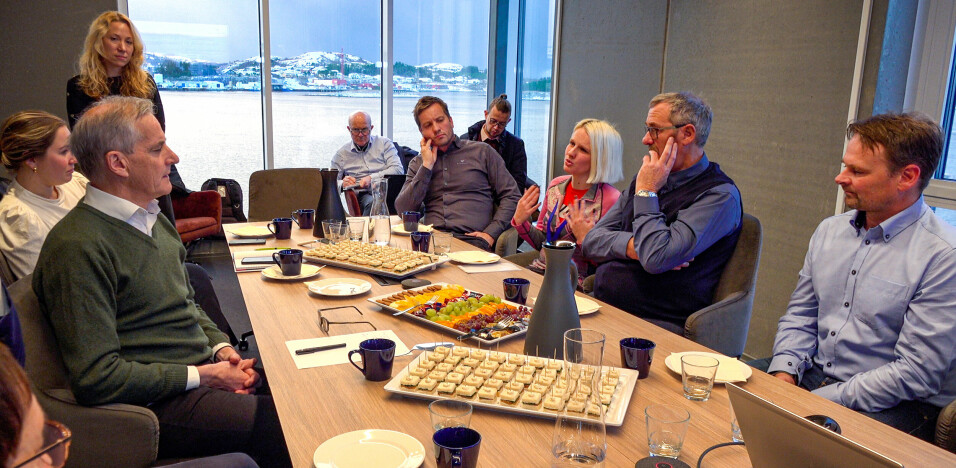
Norway PM meets workers threatened by his salmon tax
Støre visits processing facility but doesn’t seem to understand industry’s dilemma, says SinkabergHansen spokesman
Norway’s Prime Minister, Jonas Gahr Støre, has come face to face with processing workers who face losing their jobs because of his government’s proposed 40% “resource” tax on salmon farmers.
The Labour Party leader spoke to workers, union representatives and management during a visit to salmon farmer SinkabergHansen’s primary processing plant on Marøya, near Rørvik in Trøndelag county.
SinkabergHansen spokesman Ketil Rykhus told Fish Farming Expert’s Norwegian sister site, Kyst.no, that the meeting went well but there was no breakthrough.
“We took the time we needed in the meeting room. The Prime Minister was responsive, and it seemed that he understood the challenges we face, but nothing new came. They say this should be a real consultation, but aren’t all consultations real then?” said Rykhus.

No contracts
“We told the Prime Minister about the consequences we have had and will have from the [tax] proposal. As of the new year, we have no new signed contracts at the slaughterhouse, and thus we found ourselves obliged in mid-November to send out lay-off notices to our employees at the slaughterhouse. From 1 February, we can therefore risk that the vast majority of those who work in further processing with us will be made redundant.”
The government initially proposed that the tax calculation each for farmer would be based on a national average price achieved on the spot market, but this didn’t factor in the lower prices achieved for fixed-price contracts. This meant farmers could be paying tax on money they never made.
As a result, salmon farmers have been reluctant to sign fixed-priced contracts, and this has led to secondary processing facilities laying off staff.
Støre and finance minister Trygve Slagsvold Vedum have since said that salmon farmers will be taxed on the real income for their fish but have not brought forward a specific plan.
Tax to apply from January
The fact that farmers will be taxed in 2024 on earnings made in 2023, despite not knowing exactly how the tax will work and therefore how to budget for it, is another issue vexing salmon producers.
A public consultation on the resource tax isn’t due to finish until January, and it may be several months before Norway’s parliament, the Storting, debates the tax and votes on a final proposal.
It is an unjustifiable taxation of the aquaculture industry that has been hastily carried out by the government, without there having been a dialogue with the aquaculture industry in advance
SinkabergHansen spokesman
Ketil Rykhus
Rykhus said that Støre and Vedum do not seem to understand the situation they have put the aquaculture industry in.
“What is a shame is that the government has run a process in secret, where there has been a short consultation period for such an extensive proposal which has a deadline of 4 January, and the industry has not had the opportunity to sit down and look at all the consequences and the proposals in their entirety before this is to be introduced from 1 January,” he said.
“It is an unjustifiable taxation of the aquaculture industry that has been hastily carried out by the government, without there having been a dialogue with the aquaculture industry in advance.”
Støre reiterated in the meeting that the tax would be applied on real income.
100%-plus tax rate
“That could be fine. But it seems that it has been decided that there will be a base rate of 40% from 1 January before the consultation proposal is reviewed in the Storting,” said Rykhus.
“This means that, based on the accounting figures for 2021, SinkabergHansen could receive a resource tax of 85%. If you take the 2022 figures as a basis, we will get a taxation of over 100%. This means that we may have to tap the equity for necessary development, and thus cannot make investments such as steps at our salmon factory to further increase secondary processing.”
Rykhus said that the farming company’s most important aim during the meeting was to be clear about the consequences for the company and the industry.
“The clarity we need in relation to the conclusion of new contracts seems unlikely to be obtained until the consultation proposal has been processed in the Storting. Then it may be too late. We cannot have people furloughed for more than a year and a half, then we have to fire them. This will have major consequences for the company and our employees. I think Støre understood this, but we realise that it will be difficult to get a concrete and clear enough answer from Støre and Vedum as to how this should be resolved,” concluded Rykhus.























































